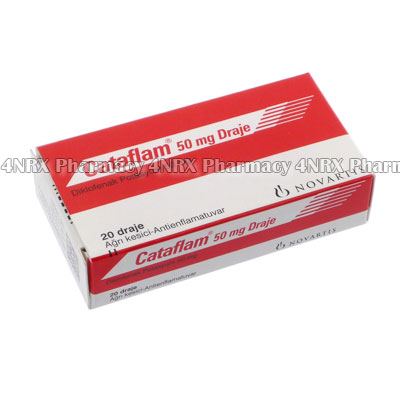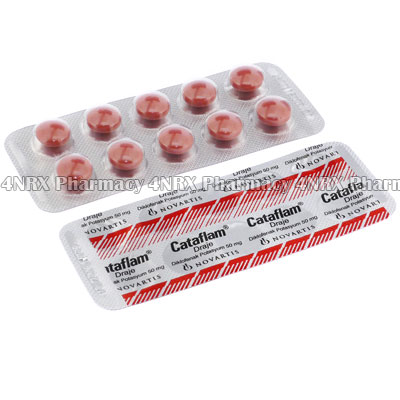 |
Home  Arthritis Arthritis  Cataflam (Diclofenac Sodium) Cataflam (Diclofenac Sodium) |
|
|||||||||
|
|
Cataflam (Diclofenac Sodium)
What is Cataflam (Diclofenac Sodium) used for? This product is manufactured in Turkey. Cataflam (Diclofenac Potassium) is an oral non-steroidal anti-inflammatory drug (NSAID) prescribed to treat patients suffering from arthritis. The medication operates by blocking the action of prostaglandins responsible for causing the pain, irritation, and swelling associated with these conditions to allow easier and more comfortable flexing of the affected joints. This action also makes it effective for treating gout, lower back pain, pain following surgery, or pain caused by accidents such as strains or sprains. Your doctor may prescribe it to treat other unlisted conditions, as well. How should I use Cataflam (Diclofenac Sodium)? Cataflam (Diclofenac Potassium) is normally taken once or twice each day at a dosage of one tablet, but your particular regimen will depend on the condition being treated and the severity of your symptoms. These doses should be swallowed along with a full glass of water and a meal to prevent nausea that may occur. Do not lie down within ten minutes of taking the dose. Never change the form of the tablets by crushing, splitting, or chewing them as this may destroy or alter the effects of their contents. Ask your pharmacist or doctor any questions you have about the medication to ensure the correct application. What are the side effects of Cataflam (Diclofenac Sodium)? Some patients using Cataflam (Diclofenac Potassium) may experience side effects including:
Inform your doctor about any symptoms that become severe or if more serious side effects occur such as unusual swelling, rapid weight gain, sensitive skin, muscle pain, chest pain, seizures, choking sensation, coughing up a substance resembling coffee grounds, discoloured stools, or jaundice. These may require emergency medical attention or adjustments to your dosage to prevent further problems from appearing. Please Note Cataflam (Diclofenac Sodium) should not be used by patients with a peptic ulcer, severe heart failure, kidney failure, liver failure, or severe reactions to other NSAIDs in the past. It is also important to inform your doctor if you have hypertension, heart failure, angina, inflammatory bowel disease, diabetes, history of asthma, history of allergies, clotting disorders, connective tissue diseases, cerebrovascular disease, high levels of cholesterol, or a history of intestinal disorders. These conditions may require reduced dosages or other adjustments to prevent potential complications from occurring. Strictly use Cataflam (Diclofenac Sodium) as prescribed and follow all instructions provided by your doctor. Safe, suitable, and optimum dosage can vary and is dependent on the patient`s health and medical history, as well as the condition you are treating. Cataflam (Diclofenac Sodium) may not be safe or suitable for all patients. Always ensure your doctor is informed if you are pregnant or breastfeeding, using any other type of medication (including non-prescription medicine, vitamins, and supplements), as well as if you have any allergies, other illnesses, or pre-existing medication conditions. Seek immediate medical attention or proceed to your nearest accident and emergency department if you suffer a hypersensitive or allergic reaction. Symptoms usually present during a reaction of this nature include difficulty breathing or swallowing, swelling of the limbs or face, tight chest, hives, and skin rashes. 

|
||||||||||||||||||